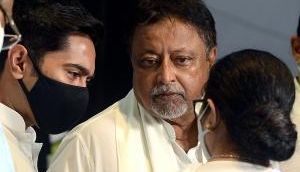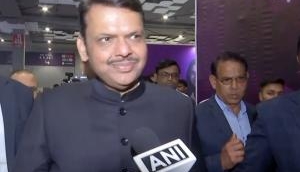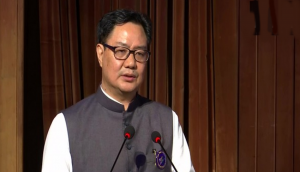
The gay rights debate has been reignited with Finance Minister Arun Jaitley talking about how Supreme Court might have erred in reversing the Delhi High Court's order on declaring Section 377 unconstitutional. Speaking at the Times LitFest, Jaitley pointed out that the Supreme Court must reconsider its judgement and that it was not in accordance with the jurisprudence as prevalent across the world.
Also read: 'SC shouldn't have reversed Delhi HC's order of decriminalising consensual gay sex'
What's interesting is that the same platform was used by former finance minister P Chidambaram in expressing the same view on the contentious law.
But first here's what Section 377 stands for.
Unnatural offences.-Whoever voluntarily has carnal intercourse against the order of nature with any man, woman or animal, shall be punished with 1[imprisonment for life], or with imprisonment of either description for a term which may extend to ten years, and shall also be liable to fine. Explanation.-Penetration is sufficient to constitute the carnal intercourse necessary to the offence described in this section.
Source: Indian Kanoon
This is the section that in 2009, the Delhi High Court had struck down as unconstitutional.
But in December 2013, while hearing the petition filed by several religious groups, the Supreme Court reversed the Delhi High Court order, thus upholding the constitutional validity of Section 377.
But wait, it added a very important caveat in the last paragraph of its judgement
Here's the relevant part of the judgement:
While parting with the case, we would like to make it clear that this Court has merely pronounced on the correctness of the view taken by the Delhi High Court on the constitutionality of Section 377 IPC and found that the said section does not suffer from any constitutional infirmity. Notwithstanding this verdict, the competent legislature shall be free to consider the desirability and propriety of deleting Section 377 IPC from the statute book or amend the same as per the suggestion made by the Attorney General.
In its judgement, the court very categorically stated that while it believed that Delhi Court was wrong in striking down Section 377, the Parliament could repeal or amend Section 377.
So, now with eminent members of both the ruling and the principal opposition on the same page on the issue, the obvious question is why not bring it up in Parliament.
Catch spoke to Anand Grover, senior counsel who was fighting the Section 377 to understand ifthe legislative route will be more desirable for a conclusive decision on the contentious section. Currently, a curative petition on Section 377 is pending before the Supreme Court.
Q. Now important members of both the Opposition and the ruling party have spoken about how the Supreme Court erred in reversing the Delhi Court's ruling on Section 377. While it's a welcome statement, do you sense an unwillingness among members of the Parliment to take up the issue head on instead of depending on the Court to take a final call on it?
A. First, I am must congratulate both Mr Chidambaram and Mr Jaitley for taking such a bold stand. It is a very significant development. But to answer you question specifically, whether the Court takes it up or the Parliament it really doesn't matter. If the government holds a certain view on the issue and asks the Attorney General to present it before the court, even then thing could move in a positive way.
Ideally, the Parliament should take it up. But there are several constraints within the Party structure, in both parties (BJP and Congress). There are people within the party who may or may not support.
There the legislative route could be long winded and complicated. However, the Court doesn't have such constraints and complications and it too has a duty. I think, it was the earlier judgement that abdicated Supreme Court of its responsibility is in itself not correct.
So I believe what Mr Jaitley suggested about Section 377 and the court is absolutely correct.
Q. But what Jaitley expressed was his personal opinion. No one is saying that it's the government's stand. Should we not know where the ruling party stands on paper when it comes to homosexuality and gay rights?
A. This ambiguity is not confined to only the ruling party. It is across all political parties. But you have to see that Mr Jaitley is a minister and a very important person in the government. I think for him to make such a statement, it carries some authority. It has certainly given a new hope. They have to resolve the problem within their party as do other parties.
Q. As a pressure group, shouldn't the gay right activists insist that the government take corrective measures?
A. As part of the movement, activists have been reaching out to political parties because it is not a partisan issue and it concerns the whole society.
Q. What has been the response from political parties? Are gay rights even on their agenda?
A. As part of a movement and advocacy, we have to reach out to all sections of the society including the political parties. The fact of the matter is that though we lost the Section 377 case in the Supreme Court, there has been a significant development in the transgender movement. That made a big change. It has opened the discussion for other issues including gay rights issues.
Now, people are realising that the issues are similar. You can't only have the transgender community having equal rights. What about the sexuality issue? These things are coming and there is a discussion going on. It won't be easy because over the 150 years of British rule people have imbibed the philosophy of criminalisation of alternative sex. But we have to reclaim our own space historically.
So, in that sense what Jaitley and Chidambaram said makes a lot of difference in starting a political discourse.
Q. On an earlier occasion the government had made it clear that it can't take any call on Section 377 unless the Supreme Court decides on the curative petition on it pending before it. What is the status of the curative petition?
A. The court has to list it sometime. It is yet to be listed.





_in_Assams_Dibrugarh_(Photo_257977_300x172.jpg)


![BJP's Kapil Mishra recreates Shankar Mahadevan’s ‘Breathless’ song to highlight Delhi pollution [WATCH] BJP's Kapil Mishra recreates Shankar Mahadevan’s ‘Breathless’ song to highlight Delhi pollution [WATCH]](https://images.catchnews.com/upload/2022/11/03/kapil-mishra_240884_300x172.png)

![Anupam Kher shares pictures of his toned body on 67th birthday [MUST SEE] Anupam Kher shares pictures of his toned body on 67th birthday [MUST SEE]](https://images.catchnews.com/upload/2022/03/07/Anupam_kher_231145_300x172.jpg)






